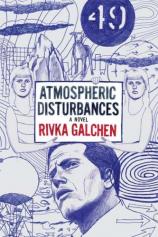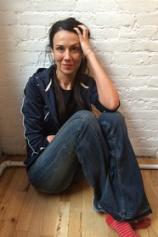Reading Group Guide
Discussion Questions
Atmospheric Disturbances

1. Discuss the novel’s epigraphs. Does your own experience with love and friendship match the observations of the French philosopher Gilles Deleuze? What is the effect of reading a quote from the “real” Tzvi Gal-Chen, followed by scenes of a fictional character who bears his name? How do Gal-Chen’s thoughts on prediction and knowledge predict various outcomes in the novel?
2. How much did you trust Leo as a narrator? What did you initially think the novel’s mysteries were? How did you interpret the various clues provided by the characters?
3. What symptoms does Harvey have in common with his healers? How did Rema’s scheme, coaching Leo through his impersonation, affect the mental health of the other characters?
4. What makes meteorology an ideal metaphor for love and marriage?
5. On page 14, Leo describes the limits of reality testing for some patients. How do the novel’s characters distinguish between reality and illusion? How do most of us test reality --- in love, at work, in politics?
6. In what ways does Leo’s “Dopplerganger effect” (emphasized in Chapters 8 and 9) prove to be both true and absurd?
7. Consider Rema’s puppy. What role does it play in propelling the storyline?
8. How does the situation change when Leo meets Magda? What effect do she and Anatole have on Rema? Ultimately, does anyone know Rema better than she knows herself?
9. On page 157, Leo describes the significance of the interpretive leap. How did you interpret the sign at the bottom of the page? How do the novel’s characters balance their interpretive leaps with empirical laws?
10. In what way do the desaparecidos, the vanished victims of Argentina’s “dirty war,” form a meaningful part of Leo’s travels in South America?
11. What shifts occur when the setting changes to Buenos Aires? What keeps Leo oriented in both New York and Argentina?
12. How was your reading affected by the photographs that appear on pages 26 and 147? Can photography capture fiction?
13. What criteria would your family and friends use if they were trying to determine whether you were the real You or an impostor?
14. Rivka Galchen weaves many philosophical references into the novel, ranging from the term “simulacra” itself to critical theorists of the Frankfurt School (such as Theodor Adorno) to poststructuralist theory (such as Jacques Lacan’s mirror stage). Yet she was also hailed by the novelist Francisco Goldman for producing a novel that is “as funny as any episode of The Simpsons.” What techniques enable her to achieve such a broad range of tones? Is this novel a spoof? A tragedy? A realistic account of a fracturing mind? A fable? How does the genre affect your reading of the story?
15. Chapter 22 is written almost entirely in the future tense. How does this affect your reading of the closing scenes? What do you predict for the characters’ futures?
Atmospheric Disturbances
- Publication Date: May 27, 2008
- Genres: Fiction, Psychological Suspense
- Hardcover: 256 pages
- Publisher: Farrar, Straus and Giroux
- ISBN-10: 0374200114
- ISBN-13: 9780374200114








